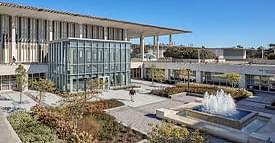Master of Science [M.S] (Food Science)
STEM Course
2 years
Full Time
On Campus
Field of Study:
₹27.5 L/Yr
$32,018 /Yr
Tuition Fees
| Year | 1st Year Fees |
|---|---|
| Tuition Fees | ₹2751627 (USD 32018) |
Other Expenses
| Head | Avg Cost Per Year |
|---|---|
| Housing | ₹766241 (USD 8916) |
| Food | ₹428239 (USD 4983) |
Previous Year Tuition Fees
| Year | 1st Year Fees |
|---|---|
| 2021 | ₹2551559 (USD 29690) |
- The department's professional activities include teaching, research, and extension functions. The program provides an educational, research, and informational center in food science for North Carolina and the nation. The department also houses two research centers, the Southeast Dairy Foods Research Center and the Center for Advanced Processing and Packaging Studies. Course offerings and research opportunities are available in the following areas: chemistry-biochemistry, engineering, microbiology, nutrition, and processing technology. The strategic directions of the faculty and staff are in the areas of food safety and foodborne disease prevention; food manufacturing and entrepreneurship; instructional innovation and effectiveness; and, foods for health and well-being.
- NC State’s program attracts students from a variety of academic backgrounds, including those with degrees in agricultural science, biochemistry, and engineering. NC State offers a non-thesis and a thesis degree option. Admission to either degree option is limited by faculty time commitments and financial resources.
- M.S. in Food Science – Thesis
- General knowledge of food science and related disciplines allows graduates to conduct, analyze, and communicate research in academic or industry settings. Courses include chemistry, engineering, microbiology, processing, nutrition, and sensory analysis.
- Master of Food Science – Non-Thesis
-
This 36 credit hour, the non-thesis option provides graduates with the skills to communicate core product and quality concepts in an industry setting. The curriculum emphasizes food product development and food safety. It also develops an understanding of the business structure, as well as organizational, teamwork, and communication skills.
-
Read More
Eligibility & Entry Requirement
Academic Eligibility:
- The Student should be a graduate of an accredited program in food science or the equivalent.
- A 3.0 overall undergraduate grade point average.
- Submission of IELTS, TOEFL, or PTE scores is required.
Read More
TOP Scholarships
| Scholarship name | Award amount | Eligibility |
|---|---|---|
| - | - | - |
| - | - | - |
| - | - | - |
Key Resources for Your Study Abroad Journey
Scholarship Grants & Financial Aids
| Name | Scholarship Per Student | Level of Study | Type | |
|---|---|---|---|---|
| Debesh Kamal Scholarship | Scholarship per student₹ 1.2 L/Yr$1,385 | Level Of StudyBachelor | TypeMerit-Based | |
| Ritchie-Jennings Memorial Scholarship Program | Scholarship per studentVariable Amount | Level Of StudyBachelor | TypeMerit-Based | |
| Young Professionals Program | Scholarship per studentVariable Amount | Level Of StudyDoctorate | TypeMerit-Based | |
| Innovation in Education Scholarship - La Tutors 123 | Scholarship per student₹ 42,970/Yr$500 | Level Of StudyBachelor | TypeMerit-Based | |
| Gyandhan Scholarship | Scholarship per student₹ 1.1 L/Yr$1,222 | Level Of StudyMaster | TypeMerit-Based |
Similar Programs
| Program | Important Date | Total Fees | Median Exams Score | Action |
|---|---|---|---|---|
-- | INR 27.5 L/Yr USD 32,018 /Yr |
|
Do you think the Dates are wrong ? Report Here
Similar Colleges


University at Albany
Albany, New York


Northern State University
Aberdeen, South Dakota


Abilene Christian University
Abilene, Texas
.jpeg?h=143&mode=stretch)

Ohio Northern University
Ada, Ohio


University of South Carolina
Aiken, South Carolina


University of Akron
Akron, Ohio


State University of New York Polytechnic Institute
Albany, New York


University of New Mexico
Albuquerque, New Mexico


Alcorn State University
Alcorn, Mississippi














.png?h=40&w=40&mode=stretch)










Comments